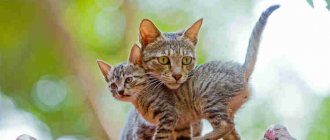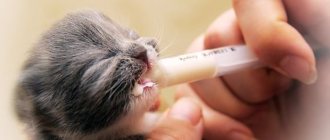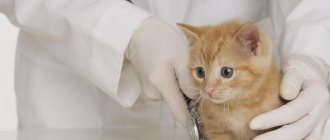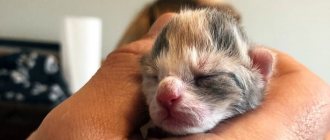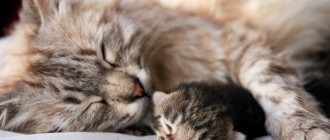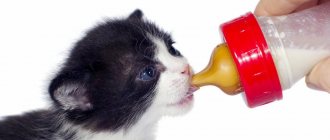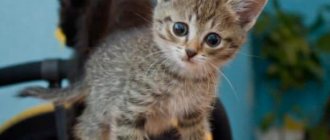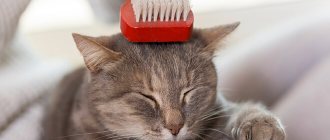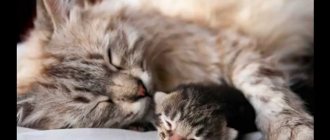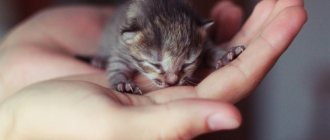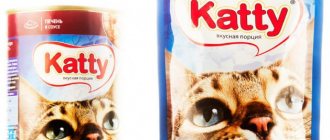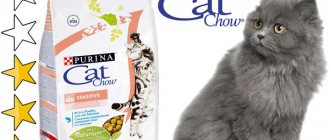Milk for kittens is a valuable, nutritious liquid that they receive from their mother. When the cat stops feeding the baby, he switches to solid food. The body reduces the production of the enzyme responsible for digesting milk. If you give your baby cow's milk instead of age-appropriate food, it may cause stomach upset.
Features of nutrition and digestion in kittens
Newborn kittens receive from mother's milk all the substances necessary for development. Cow and goat are not suitable because they do not contain the required amount of fat, protein, calories, and amino acids.
The milk that newborn kittens receive from their mother on the first day after birth not only transfers nutrients. The liquid contains antibodies that help babies fight viruses and bacteria that are dangerous specifically for cats.
A few days after birth, the amount of protein and fat in cat's milk increases. The latter contribute to the development of the nervous system of babies. Towards the end of feeding, the composition of the liquid changes, preparing the baby’s body for the transition to wet, then solid food of a carnivore.
Which dairy products are not harmful?
Our purrs drink milk with pleasure, and rarely do any of them refuse such a delicacy. However, if your cat feels unwell after eating it, then you should not immediately categorically exclude absolutely all dairy products from its diet. Very often in such cases they give a little cottage cheese, fermented baked milk, and fermented milk products.
You should not treat your fluffy with sweet cheeses or yoghurts. The animal’s stomach will definitely not be able to accept such food and this will be a real blow to the pancreas.
It turns out that fermented milk products are best absorbed, but it is better to exclude sour cream altogether. If you want to give it to a cat, then dilute it in a 1:1 ratio with water, since it is too fatty. Of the cheeses, you can only have Adyghe cheese, and also in small quantities. The rest of the products are too fatty and salty and will harm the animal.
Something else interesting: Fat sources for cats
Why cats can't have milk
Kittens grow very quickly and gain weight, so up to 12-16 weeks, food should be high-calorie and not contain components that disrupt the functioning of the digestive tract. First of all, this applies to cow and goat milk.
Lactose intolerance in cats
Dairy products contain lactose, a type of sugar that consists of glucose and galactose. It imparts sweetness to the liquid, which is an advantage of a milk drink for humans. But cats' taste buds do not respond to it.
Moreover, with age, the digestive system of pets reduces the synthesis of the lactase enzyme, which helps process lactose. Excess lactose is retained in the body, settles in the intestines and begins to interact with bacteria. Therefore, diarrhea and bloating in cats is the main sign of lactose intolerance.
Interesting fact: cat milk contains much less lactose than cow's and goat's milk - 3.4% versus 4.6%.
Milk in the diet of adult cats
Cats are carnivores, 70% of their diet should be meat, and dairy food cannot replace it. Some pets tolerate the product normally, without diarrhea or bloating. But due to the lack of necessary nutrients, there is no point in giving a milk drink to adult cats.
Benefits and harms
Despite numerous statements by scientists about the indispensability of cow's milk, this product in the diet of pets is considered absolutely useless and even harmful.
Experienced veterinarians even advise owners of purebred animals to replace this product with dry or wet food that is more nutritious and beneficial for animals.
What is the uselessness and harm of milk:
- There are a lot of calories in a whole drink, and their excess in the body of cats can lead to metabolic imbalance, which will lead to obesity;
- the composition contains quite a lot of casein and lactose, which are poorly absorbed by the animal’s body;
- against the background of intolerance to the incoming components, the cat can very quickly develop an allergic reaction;
- very often, feeding cow's milk to adults ends in banal diarrhea, which can also turn into a chronic form, in which serious dehydration of the body is observed;
- in addition to stool disturbances, the cat develops flatulence, bloating and other painful symptoms.
This futility is noted when feeding adult cats. As for kittens, the diet of small pets must include milk, preferably natural mother's milk.
If there are insurmountable difficulties with breastfeeding, it is necessary to find a useful replacement that can bring undeniable benefit and not harm to the body of a growing animal.
Can cats be given milk?
Do kittens get milk? Older babies who have switched to wet and solid food should not be given cow's or goat's milk. This usually happens by 8-10 weeks. Cats will not refuse dairy food, since the memory of the “taste of childhood” remains on the subconscious level.
Can kittens have cow's milk?
The maximum fat content of cat's milk is 10%, cow's milk is 3.6%. Can a small kitten be given cow's milk? No. It is unable to replace mother’s milk for a newborn, and is not needed for older pets. Moreover, the product cannot be given as the main food.
Cow's milk may not provide all the nutrients needed to keep your pet healthy. The fat present in the liquid contributes to weight gain and stomach upset in an adult cat. The low-fat product does not contain vitamins A and D, which help calcium and protein to be absorbed. This has a bad effect on the skeletal system.
Can kittens have goat milk?
Goat product contains more minerals and vitamins than cow product. It is fattier than cow's milk (6%), but this is not enough for a kitten. Goat milk has a little less lactose, so it is absorbed a little better than cow milk. However, once the kittens are on solid food, milk should be stopped.
The veterinarian can recommend a product for feeding a newborn kitten, giving a recipe for preparing the mixture. It is not recommended to give it in its pure form, since it does not contain many substances necessary for the normal development of the pet.
Can a kitten have milk from the store?
Is it possible to give a kitten store-bought milk? No. Mostly cow milk is sold in supermarkets and is not suitable for pets. Pasteurized products are especially harmful to cats. Studies have shown that it causes skeletal abnormalities, developmental defects and reproductive problems.
Moreover, do not buy cheap goods. Usually this is a low-quality product, where 2-3 tablespoons of dry powder are diluted with a liter of water, and there is not even a smell. A newborn will not benefit, and a grown pet will not need such food.
Can a kitten have powdered milk?
Pet stores sell dry food - cat milk substitutes. They can be given to kittens up to 8 weeks old if they are left without a mother or there is not enough milk. If there is no substitute on sale, the situation is critical; regular milk powder cannot be given. Call your veterinarian, who will tell you exactly how to prepare a formula for your newborn pet.
Kitten formula recipes
1. In a liter of boiling milk, stir 1 teaspoon of bone meal, 200 milliliters of condensed milk without sugar and 100 milliliters of water. The resulting mixture is filtered and cooled.
2. Mix 2 egg yolks, a glass of milk, 1 teaspoon of vegetable oil, 1 drop of Tertravit or Trivit vitamins.
3. Use 0.5 teaspoon of unrefined vegetable oil as an additive, “Tertravit” up to 0.3 milliliters, “Vitom” - on the edge of a knife. Without additives, the mixture can stand in a cold place for 24 hours. When additional components are added to half the solution before feeding, the mixture is filtered through a sieve and heated in a sterile container immersed in warm water.
4. Goat or cow's milk is mixed with protein in a ratio of 4 to 1 and whipped until smooth.
5. Mix 50 ml of raw and 50 ml of boiled milk, 0.5 yolk and 1 tsp. corn oil.
6.1 egg yolk, 0.5 l. concentrated milk is mixed until smooth.
7. 200 ml of cream with 10% fat content is diluted with water 1:2. A glass of 10% cream should be diluted with boiled water in a 1:2 consistency.
8. For weak babies, the mixture is prepared from half a glass of milk with a fat content of 3.2%, 20 ml of glucose (5%) and 1 yolk.
What and how to feed a small kitten
If you picked up a kitten on the street or the cat does not have milk, the ideal option is to find a wet-nurse cat. To do this, ask your friends, advertise on social networks.
What kind of milk should be given to newborn kittens if a wet nurse has not been found? Buy kitten replacement from your veterinary pharmacy, which can be sold in liquid or dry form.
When a substitute is not sold in your city, ask your veterinarian how to prepare formula for feeding a kitten and what kind of milk to feed the kitten. You cannot feed your baby regular cow or goat milk; it must be mixed with yolk. Moreover, do not give condensed milk, the composition of which leaves much to be desired.
How to feed a newborn kitten
The pet must be fed from a special bottle with a nipple, which can be purchased at a pet pharmacy. If it is not there, you can take a pipette or syringe without a needle. In the second case, the mixture must be squeezed out slowly, otherwise the liquid may enter the trachea.
How much milk to give a kitten
A newborn kitten needs to be fed every 2 hours. You need to give:
- 2-3 ml of mixture per 1 feeding in the first three days of life;
- from days 4 to 7, the dose should be increased to 5 ml;
- at the age of 6-10 days – 5-7.5 ml.
Then the frequency of feedings decreases:
- from 11-14 days they give 10-12.5 mixtures, feeding every three hours.
- from 15-21 days – 10 ml of the mixture 8 times a day.
- from 21 days, give 7.5-25 ml 3-4 times a day, begin to introduce solid food.
Feeding instructions
- Dilute the mixture according to the instructions, heat in a water bath.
- Place a cloth on your knees, place the baby on his stomach, slightly raise his head.
- Give him a pacifier with a bottle.
- If you take the pacifier away prematurely, the baby will crawl and squeak. When he is full, he turns his face away and falls asleep.
- After feeding, remove any remaining food from the baby's fur.
- Place your pet on its back and stroke its tummy to start the process of digesting food.
- To avoid constipation and stimulate peristalsis, massage the kitten’s tummy and anus. If it doesn’t help, you can give an enema, but for the first time ask to do it yourself.
Feeding kittens
In order for babies to develop normally, they need a proper diet with the obligatory presence of vitamins. To create mixtures for kittens, you should get a small measuring cup. You also need to know how much weight of a particular component a teaspoon or tablespoon can hold. This knowledge will be useful when preparing mixtures.
All kitten formula recipes include dairy products. At best, food that replaces cat milk is purchased at pharmacies and pet stores. However, this option is not always suitable for everyone. Therefore, people use self-created mixtures to feed kittens.
To create a milk formula for a kitten, goat's milk with a fat content of up to 2.5% or cow's milk - 1.5% is often used. Once every 2 days, you can add the yolk of quail eggs and 2-3 drops of syrup consisting of 1 teaspoon of water and 1 teaspoon of sugar to the milk.
When the kittens open their eyes, they should be given any meat mixture intended for human children. At first, it replaces one milk feeding. A day later another one and so on.
The meat mixture (2.5 ml) should be diluted with one teaspoon of water, stirring until it becomes liquid sour cream. Kittens are fed through a syringe or pacifier. The solution is stored in the refrigerator for 24 hours.
Question answer
Is it possible to give a one-month-old kitten milk from a non-cat?
There is no point if the mother has enough of it. If your baby is hungry, buy a formula designed for kittens.
Why can't cats be given milk?
The product contains lactose, which the cat's body does not digest well. The result of such feeding is diarrhea, bloating, allergies.
What kind of milk can you give a kitten?
If your baby has already switched to solid food, do not give him a milk drink.
Is it possible to feed a kitten milk?
No. If you have a newborn kitten without a mother, it is better to buy a cat milk replacer.
Should a nursing cat be given milk drinks?
No. It is better to give vitamins and minerals that veterinarians recommend for pregnant and lactating cats.
Milk replacer
Can cats drink store-bought milk? Many people choose store-bought pasteurized formulations as a substitute for cow's milk, but these products are also unacceptable for feeding animals.
An absolutely useless drink that loses all useful microelements during preparation and processing. Disadvantages also include calcium, which after pasteurization is not processed, but is deposited in the body and is practically not excreted, which contributes to the development of very unfavorable diseases.
Are sheep and goats allowed?
Goat's milk is easier to digest and is absorbed very quickly by the kitten's body. It should also be noted that it contains vitamins A, B1 and B2. The proteins contained in such milk are much less likely to cause intolerance in kittens. Goat's milk is better in composition than cow's milk. In addition, it is low-allergenic. Sheep milk is very similar in properties to goat milk.
Don't forget that store-bought cow's milk usually has reduced fat content, while goat's or sheep's milk is most often sold with natural fat content.
Thus, the question of whether it is possible to give a kitten goat’s milk can be answered positively, but it is advisable to dilute it with a small amount of water.
Goat's milk is much healthier for a kitten than cow's milk
Features of digestion depending on age
Cats belong to the order of carnivores, the class of mammals. Immediately after birth, the baby needs mother's milk. With it, he receives micronutrients, proteins, vitamins, fats and, most importantly, immunoglobulins, which form the immune system of the future predator.
The mother feeds the offspring until they are three months old. The enzyme lactase is produced in the small intestine of kittens. It is responsible for the digestion of milk sugar (lactose).
Mother's milk
From a month on, the cubs gradually begin to taste meat. The amount of breast milk consumed decreases, but it still takes up a significant part of the diet. As the kitten grows up, serious changes occur in its body. Lactase production decreases. The digestive system produces more and more proteases necessary for the breakdown of proteins.
Three months is the age when a kitten becomes an adult and stops receiving milk from its mother. By this point, the body has already adjusted to a meat diet, and lactase practically ceases to be produced. There is not enough enzyme to process lactose, so milk causes unpleasant symptoms (pain, diarrhea) in most adults.
Options for replacement
Currently, many different milk replacers are produced, designed for pets of different breeds and ages. And every responsible cat owner should know how to replace milk if necessary. So, if a cat has an allergy or intolerance to this product, the following will come to the rescue:
- fermented milk products;
- infant formula diluted with water;
- a special balanced dairy product substitute that does not contain lactose, intended for cats with sensitive digestion. Currently offered by brands such as Beaphar (Kitty Milk), Gimpet (Cat Milk), Royal Canin (Babycat Milk).
Thus, the opinion of most veterinarians is that mustachioed pets are not prohibited from feeding low-fat milk if it is normally absorbed by the body. Cats with intolerance to it can be treated to fermented milk products, again, provided that their perception is normal. But in no case is it allowed to mix dairy products with ready-made feed.
Fermented milk products in the diet of cats
If adult cats do not digest milk, what can you do to pamper the cats? Surprisingly, fermented milk products are absorbed by cats much better than dairy products.
Sour milk contains enzymes that help the gastrointestinal tract function properly. Therefore, you can try giving your pet kefir, fermented baked milk, and cottage cheese. Fermented milk products can harm an adult cat in less quantities than kittens.
Pet owners should remember that fresh kefir has a laxative effect, and kefir that is older than 2 days, on the contrary, strengthens it. It can be difficult to persuade an adult cat to eat kefir, because it is sour, and cats are unlikely to have a great desire to consume it.
Is it possible for a purebred fold-eared kitten to have fermented milk products?
Many experts believe that it is better not to give fermented milk products to kittens at all, as they can cause increased gas formation and bloating in the kitten, and there is a high likelihood of intestinal disorders.
